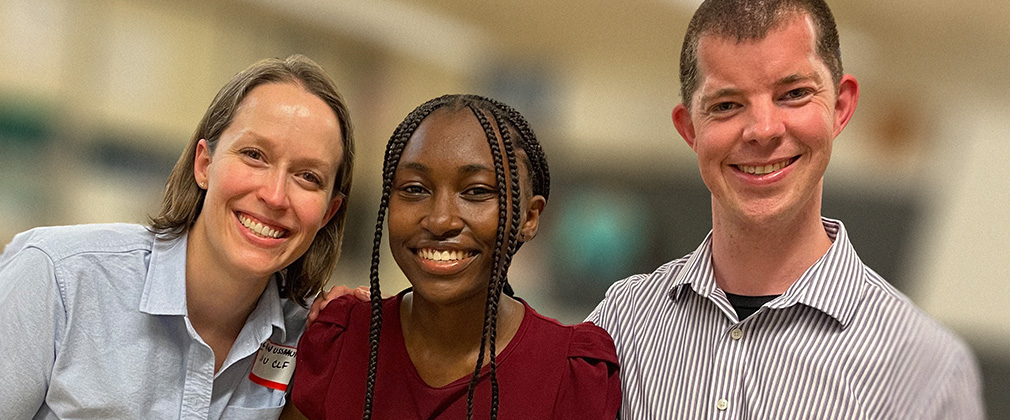A Mentorship That Connected the Dots
Tasked with finding a mentor for an independent project, high school student Ashantae Hayward searched the internet for experts in food production in Baltimore. Finding the Johns Hopkins Center for a Livable Future, she built relationships with mentors at the Center who helped her become a better researcher and scholar. They also helped her connect the dots on hunger, malnutrition, and global seafood trade.
Well known among Baltimore City public school students, the Ingenuity Project works with exceptional students pursuing the study of advanced math and science. When Hayward was a sophomore in the Ingenuity Project at Baltimore Polytechnical Institute, also known as “Poly,” she was given the option of doing a practicum with a mentor outside of the school. Encouraged by her research instructor at Poly, Dr. Nicole Rosen, she decided to pursue her interest in food and diet. Her search led her to connect with the Center’s education program specialist Phil McNab and the project director of the Seafood, Public Health and Food Systems Project, Liz Nussbaumer.
She made initial contact during the spring of 2020, during the first year of the coronavirus pandemic, when both Poly and the Center were all-virtual. Over the course of the summer, McNab assigned her about 60 research papers, online lectures, and other resources, some of them very dense, to review as they worked to narrow down her interests. She also watched the CLF film Out to Pasture, which explores farms that raise livestock with regenerative practices, in contrast to industrialized operations.
“From the start, Ashantae’s thoughtfulness, dedication, and professionalism were off the charts,” says McNab. “She read dense articles; she taught herself how to use R statistical software; and she developed profound ideas and questions about food systems. It was impressive.”
When they realized that seafood production piqued her curiosity, McNab connected her to Nussbaumer. From there, her research got more specific, and she spent her junior year (2020-2021) researching it. After a while, Dr. Rosen sat her down and said, “What do you want to know?”
“I realized that I wanted to know why low-income countries that produce seafood do not keep it for themselves,” says Hayward. “When looking at the data I was really confused. Nigeria imports millions of tons of seafood, but they also export. What they produce is not enough to feed them.”
She was able to draw conclusions about her research questions that had to do with governments and fisheries. “Nigeria doesn’t have enough money to do aquaculture sustainably,” says Hayward. “They do capture fishing, which is fine, but it’s not enough to sustain the population. They need government assistance for aquaculture.”
Through this process, Nussbaumer mentored her closely with weekly meetings, then bi-weekly meetings. As Hayward explored more research, she asked questions, and Nussbaumer provided the answers she could. For Ingenuity, Hayward had to write papers, make oral presentations, do posterboards, and create slides. McNab and Nussbaumer helped her by reviewing her work and making suggestions.
“Watching Ashantae learn and grapple with these issues was such a rewarding experience,” says Nussbaumer. “She applied a breadth of skills in problem solving, critical thinking, and genuine inquisitiveness. It was very impressive. She asked questions that my colleagues and I are still working to understand. I’m grateful to have had the opportunity to work with her and know she’ll achieve whatever she aspires to do in life.”
As her research progressed, Hayward connected more dots about broader food system topics.
“In the beginning, food insecurity and food justice were really interesting topics for me,” says Hayward. “I always assumed the problem of world hunger was that there wasn’t enough food. But I realized that there’s enough food—but it’s not distributed properly.”
A good example of this dynamic, she says, is the United States, where we waste a lot of food but still have hungry, malnourished people.
“Through this research, I connected a lot of dots,” says Hayward.
Hayward graduated from Poly in the spring in 2022 and began undergraduate studies at Tulane University in the fall. She plans to major in public health while at Tulane.
“Because of this mentorship,” she says, “I now know that I like research and that I like public health.”
